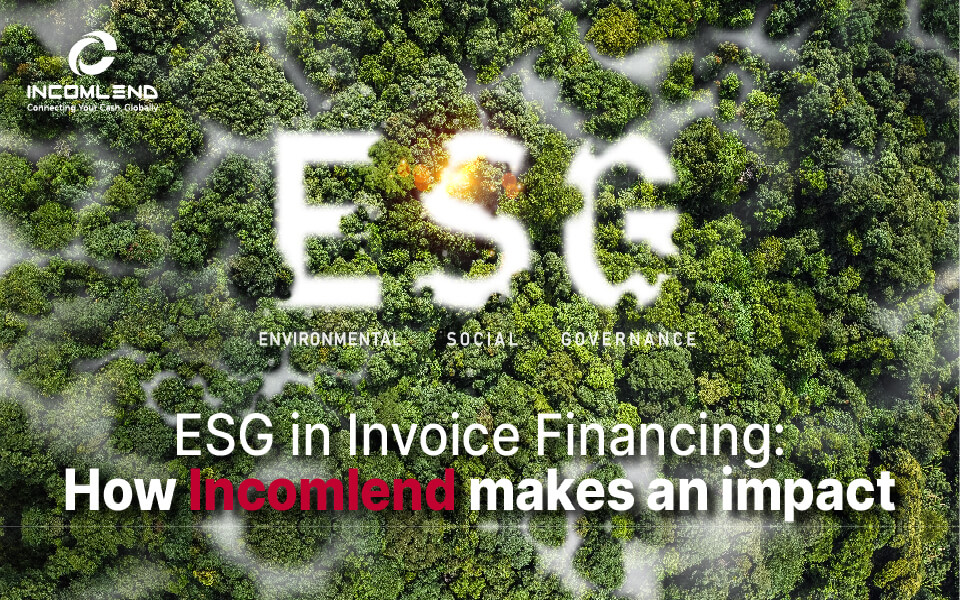Social impact through SDGs: Our commitment to ESG
March 23, 2023
In the business world, the organizations most associated with social impact are social enterprises, foundations, and B corporations. In sharp contrast, enterprises in the supply chain, such as importers and exporters, are rarely viewed as organizations that make a difference. Most see them as purely profit-driven enterprises bent on either maximizing how much they can sell goods for (i.e., exporters), or how much they can sell and redistribute them for (i.e., importers).
But enterprises on the supply chain can make a difference. One avenue is through invoice financing. At Incomlend, we measure our commitment to environmental, social, and governance (ESG) through our varied impact on the sustainable development goals of the United Nations for 2030.
Most people have seen the SDGs. While it has become increasingly popular for organizations to say they target the SDGs, for many this is only lip service. The fulfillment of their business goals does not actually contribute to certain SDGs – they just vaguely mention them.
With the goodwill that can arise from affecting social change, it’s easy to fall into the trap of only having a loose connection to the SDGs. But we have so far successfully avoided this pitfall. While Incomlend arguably addresses more than a handful of SDGs, the business makes a substantial impact on each one.
To showcase this impact on SDGs – by extension, our commitment to ESG – it’s important to illustrate how we work on several of them.
SDG 5 – Gender equality – It’s difficult for any business owner in the supply chain to receive financing. It’s even more difficult for women-led businesses to receive financing. This should, of course, not be the case. Women deserve equal access to financing, if not more so, to make up for the historical disparities in financing between genders.
Unfortunately, traditional financing methods put women at a disadvantage. Most are people- and process-driven, such as trying to obtain a bank loan. The person will have to come in, submit their necessary paperwork, and wait. Because bank financing is so relationship driven, the process is easily prone to bias – either in favor of men or even against women, – that altogether reduces the number of women who raise money.
Invoice financing breaks this glass ceiling. Because invoicing platforms are largely automated, they minimize bias. Importers or exporters just upload their necessary requirements on the platform and they can have cash in hand in as little as 48 hours. By reducing the opportunity for bias, invoice financing can provide more working capital to women-owned or -led businesses.
Incomlend strongly believes in gender equality, which we try to make evident in our very workforce. Across the entire company, 33% are women. This notably increases at the management level, where a full 40% of department heads are women. By having a
SDG 8 – Decent work and economic growth – The economic outlook for 2023 is bleak. The world may face a recession, and as businesses on the frontlines of global trade, importers and exporters may suffer the most. This problem will be exacerbated by the fact that – in addition to having a hard time obtaining financing – they will often struggle with cash flow as it is. Exporters, for example, may have to wait as far out as 120 days to be paid for goods that they sent out immediately. These business practices ensure that cash flow will be tight, which will make it difficult for these enterprises to grow.
Invoice financing provides these importers and exporters an avenue for much needed working capital. Exporters can upload an export receivable and get paid immediately, rather than having to wait three or four months for payment. Importers can also benefit: After uploading the export receivable of a trade partner, this exporter will be paid immediately, and the importer will have up to 90 or 120 days, depending on the terms, to pay back the platform.
In both importer- and exporter-led invoice financing, businesses gain crucial working capital. While this can be used for a variety of purposes, including everything from hiring more staff, purchasing more products, and expanding into new markets, they will have one ultimate impact: They help these businesses grow, which creates jobs and contributes to the economic growth of their sub-sector within the supply chain.
SDG 12 – Responsible consumption and production – Many mistakenly interpret this SDG to only apply to how things are made, but it also applies one step before that: how things are financed. In short, the supply chain industry must make it a point to provide sustainable financing to importers and exporters.
Unfortunately, this is not the case. Most bank loans, for example, place onerous terms on importers and exporters, which keep them trapped in a cycle of debt. In some cases, these bad loans may put businesses in such a precarious financial position that they go bankrupt. Some even lose assets when the loans are collateralized.
Businesses do not only deserve financing – they also deserve fair financing to help them produce and distribute products. Invoice financing presents this very option, as the requirements, fees, and terms are all extremely fair – some would even go so far as to call them business-centric. In this way, Incomlend contributes to the responsible production of goods across the supply chain creating social impact.
As we can see from these three SDGs alone, invoice financing is an avenue to create social impact. By congregating on a platform like Incomlend, importers, exporters, and investors do not only participate in transactions – they transform the supply chain for the better.
